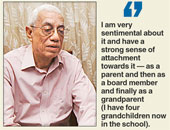 |
The controversy over corporal punishment at La Martiniere for Boys came to light when Metro reported on May 21 how Neil O’Brien and K.S. David had been dropped from the school’s board of governors. O’Brien, who had served on the board for 20 years, was in disagreement with the school’s handling of the Rouvanjit Rawla death case and the Sanjay Smart bribery case. The veteran educationist explains his stand on La Martiniere and more to Metro.
On La Martiniere: It is a great institution, with a glorious history and tradition over 175 years. I am very sentimental about it and have a strong sense of attachment towards it — as a parent and then as a board member and finally as a grandparent (I have four grandchildren now in the school). My youngest son Barry spent a very short while in La Martiniere, yet it made a huge contribution to his all-round development. That, in fact, is its greatest strength — a truly all-round education with special emphasis on co-curricular activities and personality development. It also continues to take care of many children under its Foundationer scheme and through other scholarships.
On being dropped from the La Martiniere board: The acting board is constituted every year. Currently, the bishop and the presbyter of St Andrews are the only permanent members and it’s solely their prerogative to choose the board of acting governors. I have no problem with being dropped. What hurt me is the manner in which it was done. Having served on the board for so many years, I would have preferred it if I was told by the Bishop when he and I discussed school matters on May 11. Three days later I received a letter from him saying I was no longer on the board. Surprisingly, it was dated May 10!
On the controversies on campus: Any institution is far bigger than the individuals who run it, especially a school of La Martiniere’s stature. I am sure that the current board will run the school in accordance with its rules and preserve its great legacy. I appeal to one and all to show respect for this great institution. Let the law take its course with the individuals who are accused, if found guilty. Let the school stand tall.
On corporal punishment: Section 17 of the Right of Children to Free and Compulsory Education Act bans physical punishment and mental harassment of children and I fully support this prohibition. The Supreme Court and various state high courts (including Calcutta), as well as the National Commission for Protection of Child Rights, are opposed to corporal punishment. The National Charter for Children 2003 also recognises a child’s right to protection against corporal punishment.
I can say proudly that I practice what I preach and I have brought up three sons and never laid a finger on them. Very strict action should be taken against anyone who is guilty of corporal punishment. I have told the principals and teachers of the FAPS (Frank Anthony Public Schools) that anyone who doles out corporal punishment can kiss their job goodbye. There is no justification for corporal punishment under any circumstances — it is obsolete.
The right way to manage a school and the role of a board of governors: The formation of the board depends on the constitution of the school. In most of the very old schools the constitution lays down who will be on the board and how they will be elected. People on the board should be those who share and understand the vision of the founders of the school. The day-to-day running of the school is the responsibility of the principals and the teachers, those who are appointed by the board. The board should be involved only in policy matters.
The Right of Children to Free and Compulsory Education Act, 2009 says that three-fourths of the school managing committee that has to be set up by schools, apart from the unaided ones, has to be parents.
I feel that in a managing committee everyone should be able to contribute something — there should be educationists, a financial expert, parent and staff representatives, among others. Parents should of course have a say; their main concern is generally fees. I think schools should charge fees according to facilities provided.
The management of a school should be a two-tier system — first the board which consists of the founders of the society and then a managing committee elected by the board that will have parent and teacher representatives.
(As told to ChandreyeeChatterjee)
To be continued











